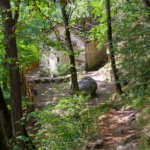Mysticism may sound an esoteric word, perhaps even too esoteric for some, but it is actually a path of action, a way of movement and seeing; it is a inner experience, a deepening within. It is prayers with open eyes as much as closed eyes, it is a outer path as much as inner one. Many may think that living a mystic’s life is reserved only for us as mystics or monks, but the simple truth is that each one of us may deepen into the mystic’s experience and live such a life; because this is a path of self awareness and spiritual growth, which allows us to then experience more fulfillment in all of our relationships – relationship to ourself, relationships to others, and our relationship to life itself also.
Not all people are mystics, monks or spiritual students/seekers in the traditional way we may understand these words; some people may have other responsibilities that need to be taken care of in their daily life or can be truckers, cashiers, single moms or school teachers in a busy city. So today I’d love to share with you how no matter where you are or what you do, or how your external life looks like, you can still live a mystic’s life through four simple ways you may apply in your every day.
When we live a more mystical life, we are essentially not only deepening and strengthening our own connection to God and the divine, but also we open our own inner worlds in a way that we are then able to see, feel, touch and experience our external in much deeper and more fulfilling ways. To live a life of a mystic is to live a life of love, embodied love; it’s something that gives us vitality, aliveness and fulfillment as we see the deep treasures of our present moment also.
There is a saying that true mystics do not debate points of doctrines nor quibble words; instead, we focus on the experience and the behaviour and movement of life itself. As mystics we explore the inner landscapes with as much passion as we explore the outer ones; we seek to see the depth of another person, to expand beyond own’s knowings, and to reach hands across the lines that separate us – whether it is the physical lines of borders and countries through travel, or the other lines of our own inner beliefs and limits.
Mysticism is a full embodied love relationship to life itself and seeing how all interconnects and interdepends in a beautiful dance; it is something that ignites a fire within us and we enter into a deep intimacy with all, because we begin to see beyond the veils, and right into the soul of matter. A truth awakens us, and a deep gratitude of our present moment takes us. Clarity of mind, purity of heart, sincerity of action. With such clear eyes and heart, all is experienced in its most natural way and deepens us into true love.
Four Simple Ways to Live a More Mystical Life
1. Daily self reflection and quiet times for spiritual connection
Monks place a lot of importance of prayer and meditation, as both offer a spiritual deepening. Meditation allows us to quiet the mind and focus and be more intent; while prayer is a way of deepening the connection to God or the divine through your own personal relationship and way of communication, and perhaps most importantly, to fall into the arms of trust and surrender, knowing that we don’t have to carry all on our own shoulders and there is a greater consciousness we may trust, greater work at hands. This deepens our own trust in life also.
Give yourself moments of quietness and some alone time each day. Some people if too busy during the day can spend some time in what I call nightly reflections. This can be a meaningful time when before bedtime you may reflect on your day, on all good things that happened, on how you showed up for others and how they too showed up for you; stay in gratitude for all the little things during the way, and play it back like a casette tape. If there were instances during the day where perhaps you could have responded better, recognize this and try to do better tomorrow. Having an honest conversation with our inner self brings us closer to our heart, to love and self acceptance.
Allow yourself to pause and reflect each day in whatever way you may resonate with – for some people it is nature or a nature walk, for others it is looking at the nightly sky allowing ourselves to see the vastness within which we exist and get out of our monkey brain that sometimes focuses on the small annoyances. Such practices allow us to essentially see our right proportion within the vastness of the universe and get a clearer perspective.
Staying in the present moment with humility and gratitude are essentially what the monk or mystic practices are based upon; so giving yourself moments of quietness where you may contemplate and self reflect are important – and whether in monastery, nature, or in bed, sit still in intention, focus and presence in your body.
Don’t forget to thank your body also; because as much as we criticize our bodies often, and are living in a world where companies profit from making us doubting ourselves and have insecurities and be constantly in a “fix yourself” mentality, our body does the best it can each day to hold us. No matter how we talk to it, our body supports us in our day, in our emotions, thinking and walking; our body is the most beloved companion to our soul.
A strong spiritual core is at the heart of a mystic’s life. For each person building their spiritual core and spiritual connection may be different and unique to them, so find your own way of connecting to your spiritual self and nurturing your relationship to God. Whether it is prayer, meditation, or nightly self reflections, give yourself the needed quiet times when you can re-connect to yourself and what matters to you most deeply, while nurturing your faith, trust in life and the gift of the present moment.
2. Expand in learning each day
Mysticism is that which expands the boundaries of the known; so this is why you may have heard that the path of the mystic begins when we unknow what we know, unlearn what we’ve thought we’ve learned, and begin our walk into the wild unknowns.
The way monks do this is that every day they spend time in learning and reading new scriptures and new subject matters. Many monasteries often have libraries, and monks spend quality time learning new things – and then reflecting upon what they’ve learned new.
It’s good to challenge our own perspectives – this is how we grow. Intelligence is often shown through how we react or respond to what challenges our own narratives; and instead of arguing constantly about anything that goes out of our fixed views, we may try to understand another perspective.
The more learn about new cultures, new beliefs, new subjects, new topics – the more we open ourselves and actually see the common threads uniting us all as humanity. This is why travel itself is also associated with spirituality and expansion, because we physically cross borders and expand our horizons; yet we don’t even need to physically travel – we may travel mentally, emotionally, not just with other people but also within our own inner worlds when we shift our eyes towards our inner lands and explore our own changing selves. We don’t need to categorize ourselves in one little fixed box; our own beliefs sometimes change too and that’s okay.
Spirituality itself is essentially an expansion of perception. As we expand in our perception, we are then able to receive something new that opens us, to feel into something unfelt before, and to see something hidden from our previous sight. Learning new things each day essentially serves the purpose of dissolving the boundaries between us and opens us to new perceptions.
Approaching life through the beginner’s mind is the way of the mystic – which basically means to approach life as new each time. Don’t assume you know all there is to know about people, stay curious and open to learning more. Even when you’ve lived with someone for many years under the same years, there are still things to re-explore, re-learn or discover all anew. We all have rich inner worlds, and these too sometimes change as our perspectives and perceptions change, so staying open and curious to learning about our loved ones, rather than assuming we know it all, is a path of love.
True love doesn’t assume nor judge, it moves, it shifts, it explores – and all of those movements are gentle and free. Love is a freedom to learn and be learned by another, to know and be known, and to stay in the lover’s vow of re-learning, re-exploring and re-discovering one another like art. And there are so many nuances. Even out in nature, even if you look at the same rose each day, she may look different and release a different fragrance to you if you approach her through your open heart and mind free of pre-conceptions. As we open and expand within, any and all walks of life, whether walking the cobble stones streets or wild nature ones, will become a mystical experience – because we learn to see beyond the surface level of things and into the depth of matter.
3. The spiritual importance of beauty, art and creativity
A monk once told me: God didn’t leave humans with rules and prohibitions and doctrines, God blessed us with curiosity to learn and creativity to express. Christian monks take time each day for their creativity to be expressed. Many of them sing psalms, or make pottery, or garden and make things more beautiful and clean.
Creativity is a divine inspired thing – it is a way of how spirit and love flows through us for us to then be shape it into something for all to experience. Our creative gifts and talents are meant to be danced for others; and don’t view this as needing to be the next Picasso or Verdi.
When you cook meal for your loved ones, you dance; when you write something of heart, you dance; when you plant the new seeds for your garden in spring, you dance. You dance for others inspiring them to dance also. You dance for others when you use your hands to shape something of love. You dance for others when you share the way you see the world and its beauty, because beauty too in nature in something not all are able to see or notice truly. So through your unique way of seeing beauty and meaning in the world – and in the way you see beauty in your loved ones and telling them – you dance love into existence.
Offer your beauty to others, dance your gifts to others.
There is a spiritual importance to beauty also, and I’ve often talked about it, because it softens us. Kindness softens us. Gentleness softens us. It inspires us. It softens our own hands, so that we too open our palms or embrace a hug. It opens our heart, and we receive more love and give more love. And when I say beauty I mean real beauty; kindness is beauty, tenderness is beauty, generosity is beauty. The reason why a rose is beautiful is because she is unmistakably herself – authenticity is beauty, our natural self is beauty.
Mysticism is about releasing that true fragrance within us – the sweetest most natural self. And this is something our world needs; we need the beauty of the true. We need those who write with hands and hearts; we need those who take real photography; we need those who infuse love into their cooking for their family every day; we need those who know how to raise others and lift then up with encouraging words and kindness.
As mystics we know we serve God, and within other people we serve the temple of God within them; for some it may be a sleeping God, for others it may be an awakened one, but we are here to show light nor perpetuate darkness. We use our wisdom, our hands, our love to raise others and nurture their own inner flames. Never underestimate the value of making someone’s day with a smile, a kind word, an encouraging word – because that too is a love you shape with your body, making love a real thing, not just some nice idea in the sky.
4. Daily physical work, dedication and movement
Daily physical work is a big part of the life of monks. Devotion is the veil through which awareness shows its beautiful face. The greatest spiritual teachings and wisdom you may not learn from ancient books, you learn through you tending to something or someone in your every day. This is where the esoteric secrets reveal themselves to you, and where life itself offers its mysticism to you.
Physical work, whether as exercise, cleaning the house, taking care of responsibilities, walks to the grocery store or working in the garden or to sew up the old pants, are all important in the mystic’s life. The body needs to stay active, because as I mentioned above, the body is the beloved companion to the soul. Mysticism is about a path of action and movement, because it is an experience both outer and inner one. So when the body moves, the soul moves.
If we stay too much in the mind and its expansion, the energy is not properly balanced; so we need to balance the movements of all four – our mind, emotion, spirit and body. This is why for monks too it isn’t about scriptures, it is about their own relationship to God and their daily experience of dedication, physical labour and devotion to that work. Whether they work in the kitchen or garden, they focus on their chores and know no task is too small or ordinary; all is an experience of God and within the physical is the spiritual, so it needs to be treasured.
Dedication to what we do reveals so much to us and allows us so much expansion; through patience of rhythm we learn trust, we learn skill, we deepen into our own selves. Patience is what opens the soul of matter. Working diligently on something teaches us important spiritual lessons of hard work such as ethics, responsibility, focus, perseverance, endurance, courage, trust, confidence. There is wisdom set in snow, gained in snow, and it is precisely through seeing ourselves work through the seasons that we see what we are made of and how to move energy consciously. We learn what real nurturing is also – because nurturing means to tend to that which already is.
In the old days, spiritual students would first work for years in service to their teacher. They would do daily chores and take care of responsibilities, and for years they would do that even being “taught” the spiritual secrets. But that’s purposeful – because it’s part of the learning. We can’t perceive spiritual wisdom if we don’t first create the inner landscapes for that knowledge to enter us properly. And it is precisely through the daily chores and dedication and devotion to all little things, that we learn patience, kindness, trust, humility, perseverance, focus and responsibility – and these are all needed because these are the foundations for spiritual growth.
For personal readings with me, you are welcome to browse through my Offerings.
Cover photography by me from my time in the South of France.

For more of my writings, browse through my Art of Love.
If you wish to support me and my work, you may do so by sharing it or donate here. For personal readings with me, you may visit my Offerings.
Your support means so much to me! Thank you wholeheartedly!




